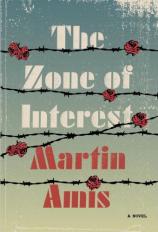The Zone of Interest
Review
The Zone of Interest
“This pencil and these scraps of paper aren’t enough. I need colours, sounds --- oils and orchestras. I need something more than words.” This declaration comes from Szmul, one of three narrators in Martin Amis’s new novel set in Auschwitz, THE ZONE OF INTEREST. Szmul is the oldest member of the Sonderkommando, a team of Jews who help the Nazis by raiding corpses in the gas chambers for valuables. They are “the saddest men who have ever lived” and “also the most disgusting.”
Szmul’s frustration with the limits of language is one that seems to be shared by Amis; perhaps never before has the author been struggling so much for the words to express himself. This insecurity is undoubtedly related to his subject matter and manifests itself in various ways. First, there’s the question of writing about the Holocaust in English. Amis peppers his prose with German words --- and sometimes entire German sentences --- often adding “ja” and “nicht” at the beginning or end of lines. This anxiety is drawn attention to by Amis’s protagonist, Angelus Thomsen, as he says, “I vaguely and confusedly wondered if the story of National Socialism could have unfolded in any other language.”
"At his best, Amis is brilliant in his rendering of the lives that met at one of history’s most diabolical junctures... History, fiction and human consciousness merge to give us one of the most vitally realized reconstructions of the horrors of the final solution."
A second worry is Amis’s concern with writing about Hitler specifically. In his very eloquent afterword, he writes at length about the unfathomable nature of the Führer: “we know a great deal about the how --- about how he did what he did; but we seem to know nothing about the why.” In the novel, however, Amis does not name the man --- always using periphrastic expressions instead, “the curious creature in the Wilhelmstrasse” for instance. It seems that Amis does not feel the right to use this man’s name in a work of fiction, and it is only in his nonfiction voice that he can do it. Even then to Amis, Hitler “seems more manageable, somehow, when escorted by quotation marks.”
The book is having a difficult time getting published in France and Germany, and Amis’s anxieties in writing it appear to have anticipated this. The closest thing to a blurb that appears on the dust jacket is a brief excerpt from the novel that begins “Once upon a time there was a king, and the king commissioned his favourite wizard to create a magic mirror.” It is as though the publisher is trying to mislead us into thinking this a fantasy novel; nothing in the excerpt tells you about the book’s setting or subject matter.
When Amis allows himself to see imaginatively into the men whose work was perhaps the most evil in all of history --- the death camp guards --- his novel takes off into flights of satiric comedy that are as sharp and compelling as anything he has written. On talking about the horrific sight of a van full of dead bodies, one character drily remarks, “You can’t take us anywhere.” Later, a death camp officer is justifying the slaughter of women and children: “Those babes in arms will grow up and want revenge on the Nazis in about 1963. I suppose the rationale for the women under forty-five is that they might be pregnant. And the rationale for the older women is while we’re at it.” These are not cheap, nasty jokes --- they are horrifically nasty jokes. In capturing the inhuman banter of the camps (which no doubt went on), Amis makes his monsters human, which in turn makes them all the more monstrous.
THE ZONE OF INTEREST is in part a love story, at times a comic one, set in Auschwitz. At his best, Amis is brilliant in his rendering of the lives that met at one of history’s most diabolical junctures, and he seems constantly to ask himself Do I have the right to do this? Ultimately, the book is its own justification; the amount of care and human sympathy that went into researching it is evident on every page. At one point, Szmul describes a dream in which he returns home to his wife. “When I begin my story she listens for a while and then turns away, shaking her head. And that is all.” This is an almost exact copy of a dream Primo Levi describes in his memoir, SURVIVAL IN AUSCHWITZ. History, fiction and human consciousness merge to give us one of the most vitally realized reconstructions of the horrors of the final solution.
Reviewed by Frederick Lloyd on October 3, 2014
The Zone of Interest
- Publication Date: September 30, 2014
- Genres: Fiction, Historical Fiction
- Hardcover: 304 pages
- Publisher: Knopf
- ISBN-10: 0385353499
- ISBN-13: 9780385353496





